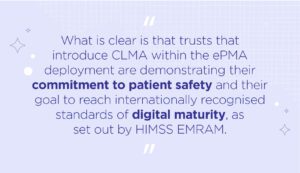Article
Optimising patient safety and efficiency through closed-loop medication administration
More than 237M medication errors [1] are made every year across England. The harm caused by these errors at any point in the process (prescribing, dispensing, administration and monitoring) has been recognised as a global issue amid increasingly complex healthcare needs and the introduction of many new medicines.
A study in BMJ Quality and Safety reports that errors are made at every stage of the process, with more than half (54%) made at the point of administration and around 1 in 5 made during prescribing (21%). Dispensing accounts for 16% of the total.
My work at Altera Digital Health has recently had me focus on exploring the impact of medication errors and how closed-loop medication administration (CLMA) is integral in helping mitigate these avoidable risks. In this blog, I will highlight CLMA and how its adoption is helping improve patient safety and efficiency while accelerating progress towards digital maturity for our clients.
CLMA: What is it and what are the benefits?
CLMA provides an extra validation at the point of drug administration. Incorporating it into drug administration processes is a prerequisite for reaching internationally recognised standards of digital maturity, as set out by HIMSS EMRAM.
CLMA uses barcode technology to positively identify the patient and validate their prescribed medications against the physical drug product (for example, with medications like pills, infusions or creams) at the point of care. This builds upon electronic prescribing and medicines administration (ePMA) that many Altera clients have already deployed as part of their EPR implementation projects.
The impact of medication errors
The BMJ [2] reports that almost 72% of medication errors are minor, while just fewer than 26% these incidents can lead to moderate harm. And just 2% could potentially result in serious harm. That said, the study shows that “definitely avoidable” medication errors cost the NHS approximately £98.5M every year and take more than1,700 lives.
Assuming a worst-case scenario hospital stay of 14 days for each adverse incident and the need for a broad range of NHS services, the estimated costs come in at £1.6B and 22,303 lives, respectively, each year.
Enhancing digital maturity

Altera Digital Health has a long-standing relationship with Liverpool Heart and Chest Hospital NHS Foundation Trust. The trust has been at the forefront of digital transformation for more than a decade, first going live with Sunrise™ EPR in 2012. Since then, the trust has been rated “Outstanding” twice by the Care Quality Commission and achieved EMRAM Stage 6 certification in December 2021.
In October 2021, LHCH introduced a closed-loop medication administration process. Built on existing ePMA functionality that was introduced in 2012, the aim was to further enhance patient safety by reducing adverse drug events and medication administration errors, a leading cause of avoidable harm in healthcare.
Improving patient safety with closed-loop medication administration
LHCH activated Altera Digital Health’s Sunrise™ Knowledge-based Medication Administration (Sunrise KBMA) module to deliver the closed-loop functionality. This enabled the trust to:
- Improve patient safety by reducing medication errors
- Save clinical time by improving drug administration processes
- Validate the “five rights” of medication administration: right patient, right medication, right route, right time and right dose
- Advance digital maturity by fulfilling HIMSS EMRAM requirements
This process is now in use for all oral medications, across all inpatient wards, and critical care. Carol Moss, EPR Manager, said this puts the trust “ahead of the curve.”
Further, Moss noted, “… we were the first Altera Digital Health customer to go live with Sunrise KBMA in the UK. Being able to do it in a complex environment like critical care without any major issues is a testament to how motivated our multidisciplinary teams are to embrace change and improve patient experience.”
Since introducing Sunrise KBMA, the trust has been able to reduce medication administration errors by 55%. The trust is also advancing its digital maturity by fulfilling HIMSS EMRAM requirements, and now has its sights set on achieving EMRAM Stage 7 in the near future.
The future
What is clear is that trusts that introduce CLMA within the ePMA deployment are demonstrating their commitment to patient safety and their goal to reach internationally recognised standards of digital maturity, as set out by HIMSS EMRAM. There are clear benefits to be seen, and what is critical is that activation of CLMA builds on their existing embedded Sunrise ePMA functionality. ePMA is an inherent part of the full EPR—ensuring the entire clinical record for the patient is easily available for review should questions arise during a drug administration round.

Learn more
Sign up to the upcoming webinar in association with Digital Health about how Liverpool Heart and Chest Hospital NHS Foundation Trust embraced digital working and adopted new technology, where you will hear more about the LHCH’s deployment of its CLMA. Read the full client story, here.
[1] BMJ Quality and Safety – BMJ Quality and Safety – Economic analysis of the prevalence and clinical and economic burden of medication error in England doi 10.1136/bmjqs-2019-010206
[2] https://www.bmj.com/company/newsroom/237-million-medication-errors-made-every-year-in-england













